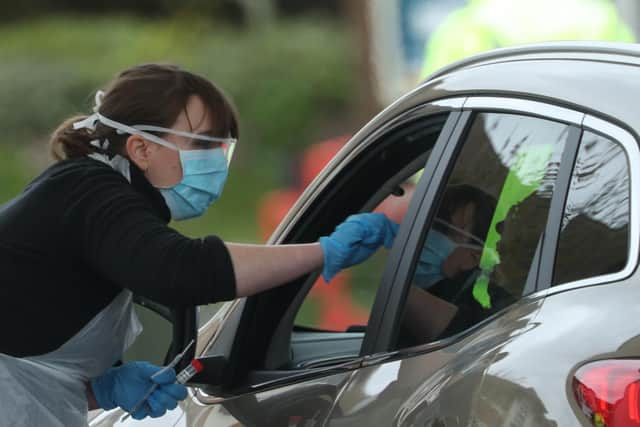Government under fire for coronavirus testing strategy as deaths dramatically rise
Some 2,352 patients had died in hospital after testing positive for the virus as of 5pm on Tuesday, the Department of Health said, up by 563 from 1,789 the day before.
In Yorkshire a further 38 people died, bringing the total to at least 114 deaths in hospitals across the region.
Advertisement
Hide AdAdvertisement
Hide AdIt comes as Downing Street said more than 2,000 NHS staff have been tested for coronavirus as the Government faces intense scrutiny over its policy on testing.


Around 8,000 test per days are currently being carried out across the UK even though ministers previously claimed a target of 10,000 tests per day had been hit.
At present, the focus is on testing patients in hospital to see if they have coronavirus, with NHS trusts told earlier in the week they should use up to 15 per cent of any spare testing capacity for NHS staff.
Health Secretary Matt Hancock has now scrapped that cap, telling NHS hospital labs to use all spare capacity to test their frontline workers.
Advertisement
Hide AdAdvertisement
Hide AdA letter from NHS England tells trusts to “max out” lab capacity to test staff, adding this “means immediate action please to ‘industrialise’ staff swabbing processes”.
Meanwhile Defence Secretary Ben Wallace became the fourth Cabinet minister to have self-isolated due to Covid-19.
The Government has blamed a global lack of reagents needed to carry out tests, though the chemical industry in the UK suggested there were no shortages.
Today (Wednesday), the Prime Minister’s official spokesman told a Westminster briefing more than 2,000 NHS staff had now been tested, adding: “We’re very clear that we want more testing to be carried out, and that we are working with NHS England, Public Health England and others to ensure that happens.”
Advertisement
Hide AdAdvertisement
Hide AdNHS staff have expressed frustration that they are being forced to self-isolate just as they are most needed, because tests are not available to show whether they are clear of the disease.
Labour’s Shadow Health Secretary Jonathan Ashworth also called for an explanation on why the UK’s Covid-19 testing is lagging behind other countries.
He said: “Germany are testing half a million people a week, yet we still haven’t hit the 10,000 a day the Prime Minister promised.
“NHS staff are rightly asking if we’ve left it too late to buy the kits and chemicals we need, or whether our lab capacity is too overstretched after years of tight budgets.”
Advertisement
Hide AdAdvertisement
Hide AdHowever, some scientists have said ramping up testing in the UK will be difficult.
Stephen Baker, professor of molecular microbiology at the University of Cambridge, said: “There are multiple issues with setting up new diagnostic testing capacity outside of regular diagnostic laboratories.
“This is not an overnight solution. Research laboratories have different approaches, equipment and staff.”
He said multiple steps were required to ensure tests are done properly and results are correctly validated, adding : “There is nothing more dangerous at the moment than reporting incorrect negative or positive results to staff or patients.”
Advertisement
Hide AdAdvertisement
Hide AdChris Hopson, the chief executive of NHS Providers, which represents NHS trusts, said maximum testing capacity in the UK was currently “very constrained” at around 13,000 tests per day.
He said on Twitter that if existing NHS pathology labs “had unlimited swabs and reagent, there would be enough test machine capacity to process around 100,000 tests a day”.
He said a small sample of tests from NHS staff over the weekend showed only 15 per cent were positive for coronavirus, and 85 per cent could go back to work.
But he added: “Before getting carried away, remember testing capacity is still v constrained (currently 13k/day) and there are 1.2 million NHS staff. So no immediate prospect of mass staff testing.”
Advertisement
Hide AdAdvertisement
Hide AdHe told the BBC he knows of one NHS trust that can only test three staff members a day due to a lack of swabs.
Housing and Communities Secretary Robert Jenrick told Radio 4’s Today programme testing capacity should hit 15,000 in the next few days.
He denied the Government and PHE would only agree to centralised testing after claims from scientists and universities that their offers of help have been rejected.
He said the Government was willing to “work with any provider” who had the “right infrastructure and skills” and urged them to get in touch.
Advertisement
Hide AdAdvertisement
Hide AdPublic Health England has also come under fire over wider testing of members of the public with Covid-19.
It has said repeatedly that most adults in good health who develop symptoms will fully recover and do not need to be tested. However, many scientists disagree and say it is only through widespread testing that the UK will be able to track the virus and emerge from lockdown.
Mr Ashworth said: “Expert after expert have called on Ministers to re-introduce community testing and contact tracing to break the chains of transmission. We’re calling on the Prime Minister to urgently publish a clear National Testing Strategy.”